Withdrawal Conventional Wisdom
As usual, Digby has an excellent post reviewing the movie "Syriana".
In his post, he postulates about precipitous withdrawal by Americans from the entire Middle East and the impact on oil supplies. We've been having a spirited discussion in the comments section and this spurred me to do a little research.
The conventional wisdom, as I read it around the web and hear it from politicians, is that the United States would be FUBAR if we abandon Iraq and the entire Middle East. Fundamentalist who gain control in Iran, Iraq and perhaps even Saudi Arabia could/would use their control of oil exports to hurt the United States severely.
While this is an important consideration, I intuitively began to question that conventional wisdom. Here's what I found:
The first piece of the puzzle is oil reserves, and it's indeed daunting:
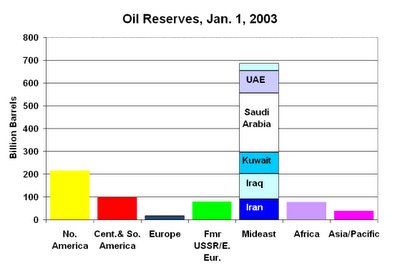 No question about it, the largest resevoir of oil resides in the Middle East. Interestingly, North America is second, although I suspect that much of those reserves are more difficult to retrieve/refine. But the there are reserves there.
No question about it, the largest resevoir of oil resides in the Middle East. Interestingly, North America is second, although I suspect that much of those reserves are more difficult to retrieve/refine. But the there are reserves there.Next, I tried to find out exactly where our oil imports originate (pdf warning):
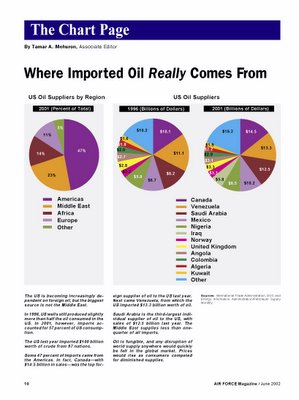 Click to enlarge
Click to enlargeHere's an additional view of where U.S. oil originates:
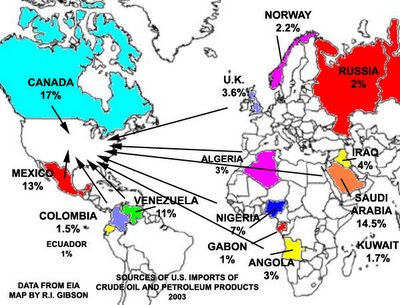
Click to enlarge
Nearly half of our imports come from "North America", which includes Mexico, Canada, Venezula. However, it's important to remember the domestic U.S. production still meets 50% of our national petroleum needs. Of the imported 50%, roughly half of that comes from North American sources. Roughly a quarter of imports, or one-eighth (~13%) of our total usage comes from the Middle East.
Here's another dandy chart showing where imports originate over time:
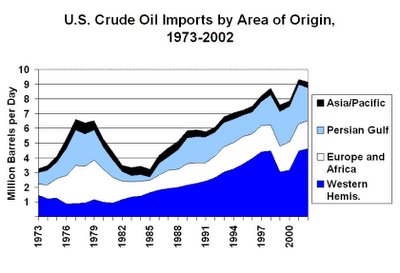 There are two important elements I tease out of this chart. One is that while oil imports continue to grow (and domestic production continues to drop), our reliance on the Middle East is relatively stable. But more importantly, take a look at the period from 1979 to 1988. We cut oil imports by nearly one-half! And despite an "embargo" by OPEC, we still imported oil from the Middle East.
There are two important elements I tease out of this chart. One is that while oil imports continue to grow (and domestic production continues to drop), our reliance on the Middle East is relatively stable. But more importantly, take a look at the period from 1979 to 1988. We cut oil imports by nearly one-half! And despite an "embargo" by OPEC, we still imported oil from the Middle East.Wow.
American adaptation to the oil shocks of the 70's is dramatic with an incredible improvement in conservation and efficiency. These years were sometimes difficult economically, but not devastating. Since this period, the CAFE standards have been relaxed, everyone drives a multi-ton vehicle to be "chic", and we're back to driving ten miles just to get a loaf of bread. And the growth in imports reflects that prolifigecy.
And make no mistake, transportation is the BIG sector for oil usage:
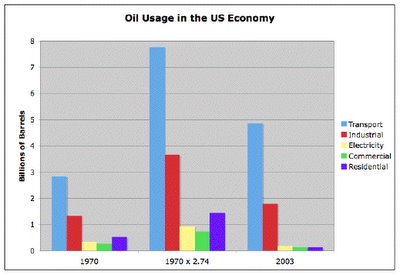
I suspect there's an enormous amount of slack in the U.S. economy in terms of energy usage. Remember Katrina? As I wrote back then, gasoline usage drop a full 5% during that "crisis".
A final piece of the puzzle for me was to try and determine just how much "they need us". That is, how much revenue does Saudi Arabia derive from oil revenue from the United States? The best I could find was this table:
Saudi Arabian Exports:
(in SR millions)
Country /Exports
U.S./ 39,891
Japan /34,221
South Korea /23,931
Singapore /13,656
Holland /9,725
France/ 9,033
India/ 7,804
U.A.E./ 6,779
Italy/ 6,640
Bahrain/ 6,581
I wish I could find better data on Saudi exports, but I don't want to take any further time with it. I think it's safe to say that Saudi income is very dependent on the west in general, and the United States in particular:
The petroleum sector [of the Saudi economy] accounts for roughly 75% of budget revenues, 40% of GDP, and 90% of export earnings.Saudi citizens pay no income tax, and there are no corporate taxes. Saudi economic development is entirely dependent on oil revenues. To think that Saudi Arabia could cut off oil exports would be economic suicide on their end. As I said in the comments of the Digby post, the relationship between the U.S. and oil producers is that or an addict and pimp. Both need each other. And frankly, I think it would be easier for the U.S. to lose 13% of it's oil imports than for Saudi Arabia to lose roughly 40% of it's national income.
So what's the bottom line?
Here's my take:
1. A precipitous withdrawal of United States troops may..or may not..result in a super-Islamic theocratic state including Iran, Iraq, and Saudi Arabia.
2. If it did. This entity may...or may not... cease oil exports to the United States.
3. If these states cut off all oil supplies to the U.S., it would result in an approx. 13% drop in oil supplies. Yes, it's alot. And there would be economic pain. But is it crippling? And is it likely that there would be the will and discipline to turn off the spigot given the income needs of the countries in question? And if, via ideological stupidity they actually did move exports to the U.S. to zero, what impact would that have on internal stability of such a government. I think it's highly unlikely any such government would risk such a dramatic economic change.
4. The United States largest oil using sector is transportation....cars. There is a lot of slack in energy usage in that sector.
6. When challenged in the past with crisis, the United States citizens have responded with the ability to severely cut oil imports.
7. The addict/pimp relationship is relatively even. BUT. The advantage is shifting to the pimp. Given the enormous reserves of the Middle East, and the depleting reserves in the West, it's incredibly important that the United States do something NOW about energy usage, and alternative energy sourcing for our economy. Collapse might not be at risk right this minute. But eventually, total economic collapse will be at risk for the United States.
8. I personally don't believe the United States will adapt, changing the oil economy without crisis. It's politically untenable (ask Jimmy Carter) to ask Americans to voluntarily sacrifice, and it seems that politicians are thus far unwilling to use government as an instrument to spur change. What has worked to create energy change, historically, has been the need to adapt based on crisis.
9. None of this discussion takes into account global warming.
Another concern posed by some with regards to a crisis in the Middle East is if these dissident countries trade out of dollars, and it's impact on the U.S. economy. This is indeed a concern. But again, it cannot happen without a reciprocal impact on them. Countries invest into dollars for a reason. And to a large degree, any effects on the United States can be ameliorated with a decrease in the budget deficits.
The main lesson I learn from this experience is this. I think BushCo put the United States in a no-win position when we invaded Iraq, accelerating an inevitable choice on our economy and energy. No solution is going to be easy or painless. We are spending over $5 billion per month in Iraq. We are exhausting our military. We are destroying our standing in the world which also carries consequences. Any continuing presence in the Middle East will continue to carry these negative consequences forward at unsustainable levels. Our entire relationship with the Middle East will have to be rebuilt, over an extended period of time.
I believe an immediate withdrawal offers the best opportunity to repair our world standing, begin to address our energy problems, and to do so without an economic collapse. I don't believe the Middle Eastern countries can or will cut off oil due to their economic dependence. The 80's taught foreign oil suppliers an important lesson. When cornered, we can cut the fat our of our energy abuse more easily than they can do without the income. But as time goes forward, and as international energy demand grows, that dynamic will reverse.
Just imagine if we had taken energy independence seriously from the 1970's?
Tick tock....
3 Comments:
Not to mention the fact that there is a finite amount of oil.
Period.
http://english.aljazeera.net/NR/exeres/08B97BCF-7BE6-4F1D-A846-7ACB9B0F8894.htm
Paul Sperry's book Crude Politics is a great read on this topic.
It would be interesting to research alternate markets for Saudi oil if they cut us off. Do the Europeans, for example, have a strong enough need to absorb the extra oil and keep the Saudi economy humming? What about the Chinese economy? There may be alternate non-US markets for Mideast oil that make it viable for their oil producers to cut off the US.
I don't think there is...yet.
But suppose there is.
A worst case scenario has the U.S. having to make up ~13% of it's total oil usage. A shock? Yes. Catastrophe? No.
Might get us off the dime to energy independence.
Post a Comment
<< Home